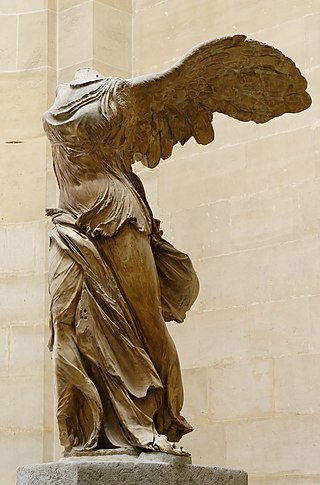Related Research Articles

The Seleucid Empire was a Greek state in West Asia during the Hellenistic period. It was founded in 312 BC by the Macedonian general Seleucus I Nicator, following the division of the Macedonian Empire founded by Alexander the Great, and ruled by the Seleucid dynasty until its annexation by the Roman Republic under Pompey in 63 BC.

The Seleucid dynasty or the Seleucidae was a Macedonian Greek royal family, which ruled the Seleucid Empire based in West Asia during the Hellenistic period. It was founded by Seleucus I Nicator, a general and successor of Alexander the Great, after the division of the Macedonian Empire as a result of the Wars of the Successors (Diadochi).

The 2nd century BC started the first day of 200 BC and ended the last day of 101 BC. It is considered part of the Classical era, although depending on the region being studied, other terms may be more suitable. It is also considered to be the end of the Axial Age. In the context of the Eastern Mediterranean, it is the mid-point of the Hellenistic period.

Sardis or Sardes was an ancient city best known as the capital of the Lydian Empire. After the fall of the Lydian Empire, it became the capital of the Persian satrapy of Lydia and later a major center of Hellenistic and Byzantine culture. Now an active archaeological site, it is located in modern day Turkey, in Manisa Province, near the town of Sart.

Antiochus I Soter was a Greek king of the Seleucid Empire. Antiochus succeeded his father Seleucus I Nicator in 281 BC and reigned during a period of instability which he mostly overcame until his death on 2 June 261 BC. He is the last known ruler to be attributed the ancient Mesopotamian title King of the Universe.

Antiochus III the Great was a Greek Hellenistic king and the 6th ruler of the Seleucid Empire, reigning from 223 to 187 BC. He ruled over the region of Syria and large parts of the rest of western Asia towards the end of the 3rd century BC. Rising to the throne at the age of eighteen in April/June 223 BC, his early campaigns against the Ptolemaic Kingdom were unsuccessful, but in the following years Antiochus gained several military victories and substantially expanded the empire's territory. His traditional designation, the Great, reflects an epithet he assumed. He also assumed the title Basileus Megas, the traditional title of the Persian kings. A militarily active ruler, Antiochus restored much of the territory of the Seleucid Empire, before suffering a serious setback, towards the end of his reign, in his war against Rome.

Antiochus IV Epiphanes was a Greek Hellenistic King who ruled the Seleucid Empire from 175 BC until his death in 164 BC. He was a son of King Antiochus III the Great. Originally named Mithradates, he assumed the name Antiochus after he ascended the throne. Notable events during Antiochus' reign include his near-conquest of Ptolemaic Egypt, his persecution of the Jews of Judea and Samaria, and the rebellion of the Jewish Maccabees.

The Kingdom of Pergamon, Pergamene Kingdom, or Attalid kingdom was a Greek state during the Hellenistic period that ruled much of the Western part of Asia Minor from its capital city of Pergamon. It was ruled by the Attalid dynasty.

In classical antiquity, the Hellenistic period covers the time in Greek history after Classical Greece, between the death of Alexander the Great in 323 BC and the death of Cleopatra VII in 30 BC, which was followed by the ascendancy of the Roman Empire, as signified by the Battle of Actium in 31 BC and the Roman conquest of Ptolemaic Egypt the following year, which eliminated the last major Hellenistic kingdom. Its name stems from the Ancient Greek word Hellas, which was gradually recognized as the name for Greece, from which the early modern 19th century historiographical term Hellenistic was derived. The term "Hellenistic" is to be distinguished from "Hellenic" in that the latter refers to Greece itself, while the former encompasses all the ancient territories of the period which had come under significant Greek influence, in particular the Hellenized Middle East, after the conquests of Alexander the Great.

The Seleucid era ("SE") or Anno Graecorum, sometimes denoted "AG," was a system of numbering years in use by the Seleucid Empire and other countries among the ancient Hellenistic civilizations, and later by the Parthians. It is sometimes referred to as "the dominion of the Seleucidæ," or the Year of Alexander. The era dates from Seleucus I Nicator's reconquest of Babylon in 312/11 BC after his exile in Ptolemaic Egypt, considered by Seleucus and his court to mark the founding of the Seleucid Empire. According to Jewish tradition, it was during the sixth year of Alexander the Great's reign that they began to make use of this counting. The introduction of the new era is mentioned in one of the Babylonian Chronicles, The Chronicle of the Diadochi.
Apama, sometimes known as Apama I or Apame I, was a Sogdian noblewoman and the wife of the first ruler of the Seleucid Empire, Seleucus I Nicator. They married at Susa in 324 BC. According to Arrian, Apama was the daughter of the Sogdian baron Spitamenes. Apame was the only of the Susa wives to become queen as, unlike the other generals, Seleucus kept her after Alexander's death.
Paul Lachlan MacKendrick was an American classicist, author, and teacher.

The Roman–Seleucid war (192–188 BC), also called the Aetolian war, Antiochene war, Syrian war, and Syrian-Aetolian war was a military conflict between two coalitions, one led by the Roman Republic and the other led by the Seleucid king Antiochus III. The fighting took place in modern-day southern Greece, the Aegean Sea, and Asia Minor.

Louis Harry Feldman was an American professor of classics and literature. He was the Abraham Wouk Family Professor of Classics and Literature at Yeshiva University, the institution at which he taught since 1955.
The Seleucid army was the army of the Seleucid Empire, one of the numerous Hellenistic states that emerged after the death of Alexander the Great.
Andrea M. Berlin is an archaeologist and the James R. Wiseman Chair in Classical Archaeology in the Department of Archaeology at Boston University. She also holds a faculty position in the Elie Wiesel Center for Jewish Studies at Boston University. Before that she held positions at academic institutions, among which were the Morse-Alumni Distinguished Teaching Professor of Archaeology in the Department of Classical and Near Eastern Studies at the University of Minnesota. She received her PhD in 1988 from the University of Michigan.
Charles Farwell Edson Jr. (1905–1988) was an American scholar of Ancient History.
Bezalel Bar-Kochva is a professor emeritus in the Department of Jewish History at Tel Aviv University. He is a historian of the Hellenistic period, the three centuries after the conquests of Alexander the Great, and the Second Temple period of Judaism. Bar-Kochva's research focuses on Judea, the Land of Israel, diaspora Jews, and the Seleucid Empire in that era. Notably, he has written extensively on the military history of the Maccabean Revolt as well as Greek views on Judaism and Jewish adaptation to Greek culture during the Hellenistic era. He is the recipient of the 2013 Humboldt Research Award Programme.
Hellenistic Palestine is the term for historic Palestine during the Hellenistic period, when Achaemenid Syria was conquered by Alexander the Great in 333 BCE and subsumed into his growing Macedonian empire. After his death in 323 BCE, Alexander's empire was divided among his generals, the Diadochi, marking the beginning of Macedonian rule over various territories, including Coele-Syria. The region came under Ptolemaic rule beginning when Ptolemy I Soter took control of Egypt in 322 BCE and subsequently Yehud Medinata in 320 BCE due to its strategic significance. This period saw numerous conflicts as former generals vied for control, leading to ongoing power struggles and territorial exchanges.